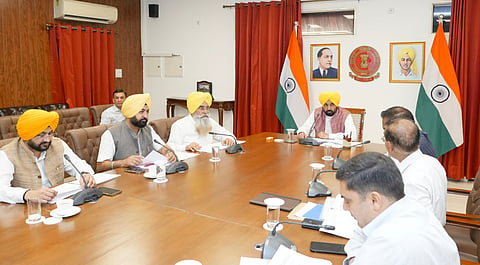

CHANDIGARH: In a first, the Punjab government on Friday approved a 14-point action plan under its Integrated State Water Plan to preserve and replenish groundwater, as the state faces an annual average water table decline of 0.7 metre.
Chairing a meeting of the Water Resources Department regarding the Integrated State Water Plan, Punjab Chief Minister Bhagwant Mann said the plan has been meticulously prepared by the department in consultation with all relevant government departments.
He said the situation is already alarming, with 115 out of 153 blocks in the state categorised as over-exploited in terms of groundwater extraction. The plan, he said, focuses on conserving groundwater and increasing the use of canal water for various purposes. This will be achieved by reducing groundwater demand, lowering agricultural water usage, improving irrigation techniques, and replenishing and artificially augmenting groundwater.
Mann added that efforts will also focus on identifying sustainable water sources, exploring deep aquifers, and promoting the use of surface water. He noted that the government has already restored 17,000 water courses covering approximately 6,300 km, which had been abandoned for 30 to 40 years. Additionally, 79 canals spanning 545 km have also been restored.
Mann approved a 14-point action plan that includes an effective irrigation strategy to ensure optimal water use in fields. The plan aims to bring around 15,79,379 hectares under water-efficient techniques such as drip and sprinkler irrigation, moving away from conventional methods to reduce net water demand and increase efficiency.
He emphasised that preference should be given to areas with a working head, where pipelines may be proposed instead of open watercourses. The plan also includes restoring canal watercourses to ensure judicious, equitable, and sustainable utilisation of surface water.
To further promote the use of surface water, Mann said excess water from canals and distributaries will be directed into adjacent ponds. Water from these ponds will then be delivered to fields using a lift irrigation system, thus expanding the area under surface irrigation. The plan also involves constructing check dams and new ponds.
The Chief Minister advocated participatory irrigation management by forming Water User Associations. These associations will help develop a self-sustaining water ecosystem and address farmers' concerns regarding water distribution.
To better understand Punjab’s deep groundwater systems, Mann stressed the need for comprehensive groundwater studies. He pointed out that southwest Punjab faces waterlogging issues, while the Kandi area has extremely deep groundwater, making a uniform state-wide plan unfeasible. Instead, the state will be divided into specific basins or catchment areas to regulate water flow, prevent soil erosion, and retain nutrients.
The plan also calls for identifying aquifer characteristics and topography. Rainfall and runoff data will be collected in low-lying catchment areas, with a focus on addressing critical zones to minimise flood damage.
Mann said research will be conducted on flood modelling and mapping, flood plain zoning, and public participation. Other proposed interventions include bamboo plantations, vetiver grass, source control, check dams, and bund construction.
The plan further proposes storing floodwater from the Ghaggar River for agricultural use. Check dams will be built at choke points or drain points in the river to divert water into existing ponds. This water will be treated through treatment plants and nano bubble technology before being transported to agricultural fields using lift irrigation systems powered by solar pumps and underground pipelines.
Finally, Mann said the plan encourages private sector participation in water management under the Corporate Social Responsibility (CSR) provisions of the Companies Act, 2013, to reduce the financial burden on the government.